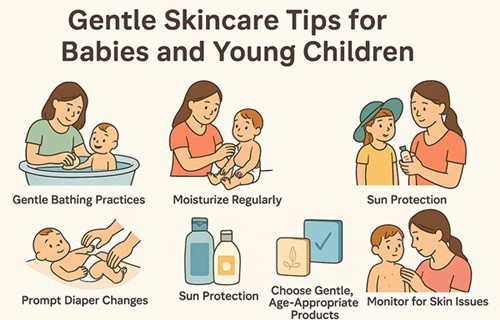A baby’s skin is delicate and more sensitive than an adult’s, making it more prone to dryness, irritation, and rashes. Young children’s skin also requires extra care to maintain its natural barrier and prevent common issues such as eczema, diaper rash, and sunburn. Establishing a proper skincare routine from an early age helps keep their skin soft, healthy, and protected.
1. Gentle Bathing Practices
Bathing is an essential part of a child’s hygiene routine, but over-washing can strip their skin of natural oils, leading to dryness. Babies do not need daily baths—two to three times a week is sufficient unless they get particularly dirty.
-
Use lukewarm water, as hot water can be harsh on the skin.
-
Choose mild, fragrance-free cleansers instead of regular soaps, which may contain drying agents.
-
Keep bath time short, around 5-10 minutes, to prevent excessive moisture loss.
-
Pat the skin gently with a soft towel instead of rubbing.
For young children, bath time can be extended, but ensure their skin is moisturized afterward to prevent dryness.
2. Keeping Skin Hydrated with Moisturizer
A baby’s skin loses moisture quickly, making hydration essential. After every bath, apply a mild fragrance-free, hypoallergenic moisturizer to keep their skin soft and prevent dryness or irritation.
-
Apply moisturizer while the skin is still slightly damp to lock in moisture.
-
Pay extra attention to areas prone to dryness, such as the cheeks, elbows, and knees.
-
If your child has sensitive skin, opt for lightweight, non-greasy formulations that absorb easily.
For older toddlers, continue applying lotion daily, especially if they are frequently exposed to air conditioning, cold weather, or dry climates.
3. Preventing and Treating Diaper Rash
Diaper rash is common in babies due to prolonged exposure to moisture and friction. To prevent it:
-
Change diapers frequently and allow the skin to dry completely before putting on a new one.
-
Use gentle wipes or rinse with lukewarm water instead of wipes with alcohol or fragrance.
-
Let the baby go diaper-free for short periods to allow the skin to breathe.
-
Apply a barrier cream with zinc oxide to protect the skin from irritation.
If a diaper rash develops, keep the area clean and dry, and avoid tight diapers that may worsen irritation.
4. Protecting Baby’s Skin from the Sun
Babies and young children have thinner skin that is more vulnerable to sun damage. Sun exposure can cause sunburn, premature aging, and long-term skin sensitivity.
-
Keep babies under six months out of direct sunlight, opting for shade instead.
-
Dress children in lightweight, breathable clothing with long sleeves and pants.
-
Use a wide-brimmed hat and sunglasses to protect their face and eyes.
-
For children over six months, apply a child-safe, broad-spectrum sunscreen to exposed areas.
-
Avoid peak sun hours (10 AM to 4 PM) when UV rays are strongest.
5. Choosing Gentle, Chemical-Free Skincare Products
A baby’s skin is highly absorbent, making it crucial to select gentle, non-toxic products. Avoid:
-
Artificial fragrances and dyes, which can cause irritation.
-
Harsh detergents in laundry soaps, which may trigger skin reactions.
-
Products with parabens, sulfates, and alcohol, as they can disrupt the skin’s natural barrier.
Opt for baby-friendly products with minimal, natural ingredients that provide hydration without unnecessary additives.
6. Managing Common Skin Conditions
-
Eczema: If your baby has eczema-prone skin, keep it moisturized and avoid harsh soaps. If needed, consult a doctor for proper treatment.
-
Cradle Cap: This harmless scalp condition appears as flaky, dry patches. Gently massage a mild oil onto the scalp before washing with a soft baby brush.
-
Heat Rash: Occurs due to sweat trapped in skin folds. Keep your baby cool, dress them in loose cotton clothing, and avoid excessive sweating.
7. Monitoring Skin Health
Regularly check for signs of irritation, rashes, or unusual skin changes. If your baby develops persistent redness, peeling, or swelling, it may be a sign of an allergic reaction or an underlying condition that requires medical attention.
By following these skincare guidelines, you can help keep your baby’s and young child’s skin healthy, soft, and well-nourished while minimizing common skin problems.
At Our Parenting World (OPW Media), we’re here to help you thrive in every role—parent, caregiver, guardian, or everyday hero —with useful and practical tips that nurture your family’s well-being and fit into your daily life.




